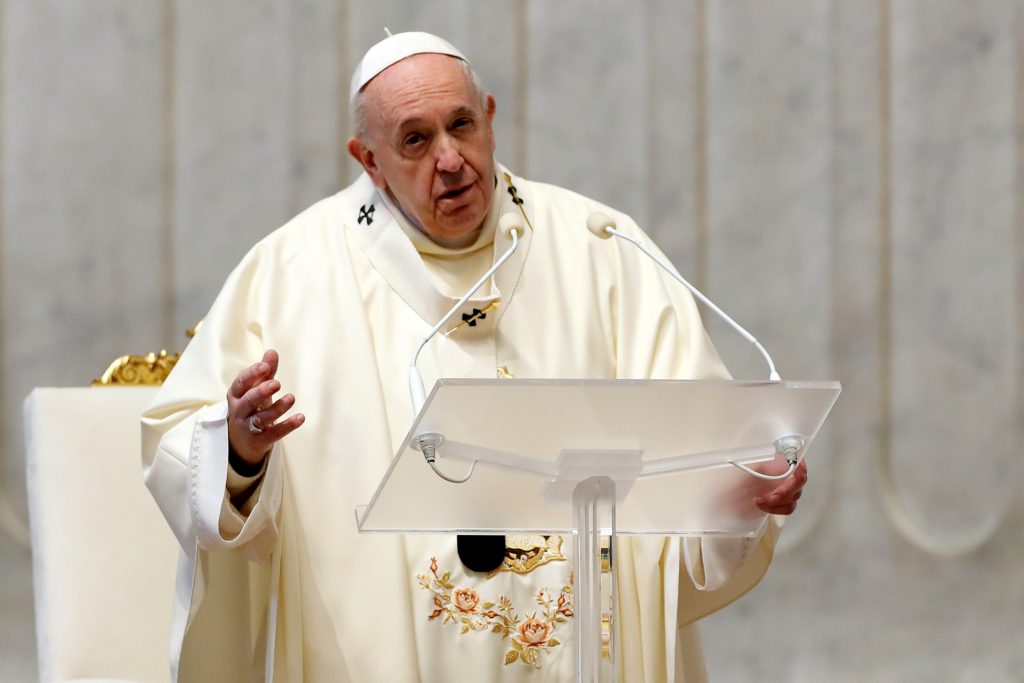
Pope Francis on Friday urged participants in a crunch United Nations climate summit in Scotland to offer “effective responses” to the global ecological crisis.
On the eve of the COP26 meeting in Glasgow, the pope made the appeal on BBC Radio 4’s flagship “Today” morning news program.
He said: “The political decision-makers who will meet at COP26 in Glasgow are urgently summoned to provide effective responses to the present ecological crisis and in this way to offer concrete hope to future generations.”
“And it is worth repeating that each of us — whoever and wherever we may be — can play our own part in changing our collective response to the unprecedented threat of climate change and the degradation of our common home.”
It is the first time that Pope Francis has recorded a special message for the British Broadcasting Corp., the UK’s national broadcaster.
He is the second pope to deliver a reflection in the “Thought for the Day” slot on BBC Radio 4. The first was Benedict XVI, who recorded a Christmas message in 2010, following his four-day visit to Britain in September that year.
In his reflection, the pope recalled meeting with religious leaders and scientists at the Vatican on Oct. 4 to sign a joint appeal urging countries to “achieve net-zero carbon emissions as soon as possible.”
Speaking in Italian with an English voiceover, he said: “I was impressed by something said by one of the scientists present at that meeting. He told us: ‘If things continue as they are, in 50 years’ time my baby granddaughter will have to live in an unliveable world.’ We cannot allow this to happen!”
“It is essential that each of us be committed to this urgent change of direction, sustained by our own faith and spirituality.”
Francis has sought to galvanize efforts to protect the environment since his election in 2013. He issued the encyclical Laudato si’ in 2015, ahead of the U.N. Climate Change Conference in Paris, which negotiated the Paris Agreement.
The Glasgow summit, taking place on Oct. 31-Nov. 12, will encourage governments to achieve the goals of the Paris Agreement and the U.N. Framework Convention on Climate Change.
Pope Francis was initially expected to attend. But the Vatican indicated earlier this month that he would not be present. The Vatican’s delegation will be led by Secretary of State Cardinal Pietro Parolin.
The summit suffered a further blow when it was confirmed that neither China’s leader Xi Jinping nor Russia’s Vladimir Putin would be attending the meeting. China and Russia are together responsible for around 32% of global CO2 emissions.
U.S. President Joe Biden will attend the summit following his meeting with the pope at the Vatican on Friday.
In his message, recorded at the Vatican, Pope Francis said that the combination of climate change and the coronavirus pandemic had exposed the world’s “deep vulnerability.”
He said: “We find ourselves increasingly frail and even fearful, caught up in a succession of ‘crises’ in the areas of healthcare, the environment, food supplies, and the economy, to say nothing of social, humanitarian, and ethical crises.”
“All these crises are profoundly interconnected. They also forecast a ‘perfect storm’ that could rupture the bonds holding our society together within the greater gift of God’s creation.”
He went on: “Every crisis calls for vision, the ability to formulate plans and put them rapidly into action, to rethink the future of the world, our common home, and to reassess our common purpose.”
“These crises present us with the need to take decisions, radical decisions that are not always easy. At the same time, moments of difficulty like these also present opportunities, opportunities that we must not waste.”
He said that countries faced the choice of “retreating into isolationism, protectionism, and exploitation” or embracing positive change.
“This last approach alone can guide us towards a brighter horizon. Yet it can only be pursued through a renewed sense of shared responsibility for our world, and an effective solidarity based on justice, a sense of our common destiny, and a recognition of the unity of our human family in God’s plan for the world,” he said.
He continued: “All this represents an immense cultural challenge. It means giving priority to the common good, and it calls for a change in perspective, a new outlook, in which the dignity of every human being, now and in the future, will guide our ways of thinking and acting.”
“The most important lesson we can take from these crises is our need to build together, so that there will no longer be any borders, barriers, or political walls for us to hide behind.”
Source: Licas Philippines
0 Comments